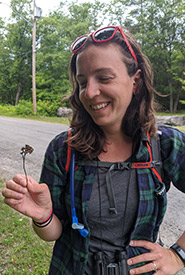
Emily Trendos (Photo courtesy Emily Trendos)
Emily Trendos
PhD student, University of Guelph (2020–present)
If you ask Emily Trendos, Weston Family Conservation Science Fellow at the Nature Conservancy of Canada (NCC), there’s nothing creepy about the crawlies she studies.
“I did my undergrad at the University of Guelph in zoology and that’s where my interest in working with insects came about,” she says. “I took all the courses I could on entomology, including two field courses — one in Vietnam and one at the Queen’s University Biological Station.”
After her undergrad, Emily continued her studies at the University of Waterloo, completing her master’s in environmental studies. Her work there focused on monitoring woodboring beetles in urban forests, and after spending many joyful hours sifting through thousands of insect samples to identify them, she knew she had found her calling.
“I’ve been working with wildlife since 2011-2012. My first field work was a volunteer position in Peru, so I thought I wanted to go into wildlife research, but I wanted to try the field aspect first to see if I would actually enjoy it. I loved it down there; it was an amazing experience, so I pursued wildlife research after that.”
To Emily, it was a natural step for her to pursue a career researching the species she loved. She has since worked in California, the Northwest Territories and in Ontario with the Ministry of Natural Resources and Forestry. She will be bringing her passion and experience studying some of Canada’s smallest critters to NCC while completing her PhD.
“I’ll be studying the mottled duskywing butterfly, which is an endangered species in Ontario and Manitoba,” she says. “It has very specific habitat requirements, so it’s especially at risk with climate change and other factors.
I’m going to be looking at population dynamics of that species, and that will help inform us when we’re doing re-introduction into suitable habitat around Ontario because it’s disappeared from a lot of those places.”
Emily believes the fellowship aspects within NCC are going to be very valuable experience, building on her knowledge about how the organization conserves land and habitat for species at risk, like the mottled duskywing.
“I don’t have a lot of experience in land acquisition and conserving — the actual process of conserving a chunk of land — so that will really help me moving forward. That’s a big part of wildlife protection study,” she says. “I’m going to be delving into the science, presenting findings, and then getting to see how that feeds back into land conservation. I’m getting both sides of the conservation coin with this fellowship.”
Learn more about Emily's research:




